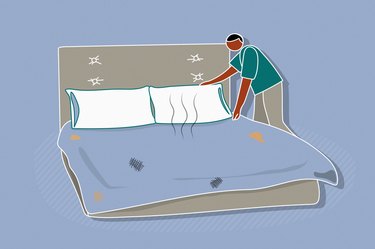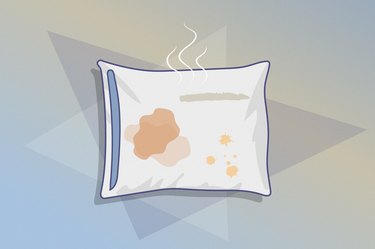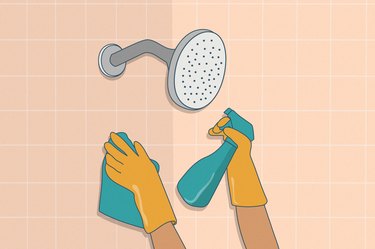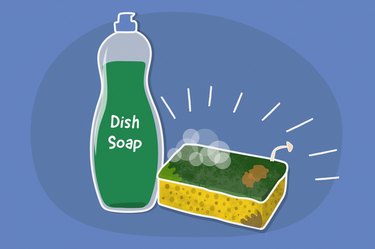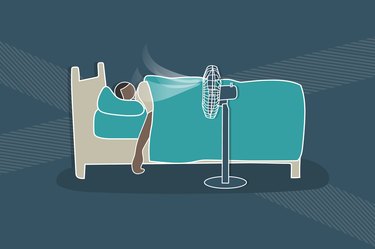
For some people, sleeping with a fan is a key element of their nighttime routine. The brisk breeze helps you stay cool and comfortable during the night, not to mention the gentle whirr can wield enough white noise to block out a car horn or snoring bed partner. But is sleeping with a fan on bad for you?
Well, it depends: Sleeping with a fan on is good in some ways, but can be harmful in others. We consulted experts to understand when fans are unsafe and what you can do to change that (including whether you should bid farewell to your favorite fan).
Video of the Day
Video of the Day
6 Ways Sleeping With a Fan May Jeopardize Your Health
Here's why sleeping next to a fan can be less-than-ideal for your wellbeing:
1. It Can Trigger Allergies or Asthma
"In patients with allergies to dust or other indoor antigens, a fan can stir up particles in the room or disperse accumulated dust on the fan itself," says Raj C. Dedhia, MD, MSCR, associate professor of otorhinolaryngology and sleep medicine at the University of Pennsylvania's Perelman School of Medicine.
Yep, your fan can kick up dust mites, pet dander and more, which may exacerbate your allergy or asthma symptoms.
Tip
This may be especially true if you sleep with a pet in your bed, as they can carry dander and other allergens, per the Cleveland Clinic.
2. It Can Contribute to Poor Indoor Air Quality (Depending on Where You Live)
The combination of cracking open a window and running a fan at night might sound like a smart strategy to keep you cool while you sleep, but it could be doing you more harm than good.
If you live in an urban environment where there's a lot of diesel emission particles, a fan can circulate these outdoor air pollutants indoors and direct them right into your upper airway, says Sam Huh, MD, chief of otolaryngology at Mount Sinai Brooklyn Hospital.
"That's very harmful, whether you're allergic to dust or not," Dr. Huh says.
Indeed, these pollutants can worsen indoor air quality. And poor indoor air quality can cause or contribute to the development of infections, lung cancer and chronic lung diseases like asthma, according to the American Lung Association.
3. It Can Cause Congestion
If you've ever experienced a stuffy nose after sleeping with a fan on, here's why: Having a direct current of air blasting your way can wick the moisture out of your body and dry up your mucous membranes, Dr. Huh says.
Once your nose gets irritated, it overproduces mucus. That's because the mucin glands work overtime to overcompensate and cover all the dry patches in your nasal passage, he says. This can cause swelling of the mucous membranes and lead to congestion.
During the wintertime, when the air is even drier and you have the heat on high, nasal congestion can get even worse. Put simply, "our upper airway wants to live in the Mediterranean," Dr. Huh says.
4. It Can Make You More Susceptible to Getting Sick
When you sleep with a fan frequently, your mucous membranes may dry up. And without the right amount of mucus, you become more vulnerable to getting sick.
"Normally our mucus provides a layer of protection so that any type of irritant or organism can't penetrate. But once it dries out, the mucosa becomes very easily penetrable," Dr. Huh says. Read: It's easier to catch a cold.
To make matters worse, when your mucous membranes dry up and there's little mucus to moisten the skin, you may also start to get cracks in your nose, Dr. Huh says. These little openings in the skin can become a gateway for bacteria to get in and cause more inflammation.
To add insult to injury, this dry, cracked skin can also cause nasty nosebleeds, he says.
5. It Can Spread Germs
Not only does sleeping with a fan on weaken your nose's defenses against possible infection, but it can also spread existing germs. If you share a bedroom with someone who has a cold, a fan will blow some of the viral particles in your direction, Dr. Huh says. In other words, a fan's current can carry a steady stream of bugs your way while you sleep.
6. It Can Dry Out Your Skin
We already know the whoosh of air from a fan can desiccate your mucous membranes. But it can also dry out your skin, particularly in cold climates with dry, heated indoor air, Dr. Dedhia says.
Remember, a fan wicks moisture from your skin. This can even leave you a little dehydrated, Dr. Huh says. That's because when you sleep, you're essentially fasting (i.e., not drinking any water), and using a fan just contributes to a greater loss of fluid and moisture, he says.
7 Ways to Optimize Your Fan
Sleeping with a fan on is bad for you in certain contexts. But don't fret: If you're a huge fan of the fan, you can nix its negative effects by trying these tactics:
1. Keep a Hygienic House
Regular cleaning, dusting and vacuuming can decrease the amount of dust and dander in your home and reduce the number of allergens that fly around due to a fan. Remember to wipe down the fan, too, because the blades accumulate dust as well, Dr. Dedhia says.
Still, cleaning alone won't solve the problem. "It doesn't matter if you clean every day; there's always going to be dust," Dr. Huh says.
2. Put a Bowl of Water in Front of the Fan
"This can help with the dehydration part," Dr. Huh says. "You can have some moisture blown your way." And in the summertime, try adding ice cubes for a cooling effect.
3. Point It Away From Your Face
Dr. Huh recommends aiming a fan at the lower part of your body. This way you're not blowing allergens and irritants straight into your upper airway.
4. Keep It at a Distance
"It's ideal to keep a fan at least three to six feet away from the face," Dr. Dedhia says.
5. Keep It on a Lower Setting
A high-powered fan will kick up more allergens and be more drying, Dr. Huh says. Conversely, a fan on a low setting will likely do less damage in these ways.
6. Use a Humidifier
Having a humidifier in addition to a fan will help circulate moisture and decrease the drying effect, Dr. Dedhia says.
Tip
Don't have a humidifier handy? Combat dry air with the help of these humidifier alternatives.
7. Keep Your Window Closed (if Outdoor Air Quality Is Low)
If you live in a high-traffic area (or any other place with poor outdoor air quality), don't sleep with the window open when you have a fan on, Dr. Huh says.
"I had a patient who had a bus that used to idle outside her window and she had horrible symptoms, but when she shut the window, she started to feel better," he says.
Forgo the Fan and Try These Alternatives
For some people — like those with severe allergies — sleeping with a fan may be more trouble than it's worth. Rest assured, you can still snooze soundly without one. Just try these expert-approved alternatives:
1. Opt for Air Conditioning
When it comes to your upper airway, sleeping with AC on is much better for you. Many air conditioners come with filters to block out irritating pollutants, Dr. Huh says.
While ACs won't aggravate your allergies, unfortunately, they're more damaging to the environment. To decrease harm to the planet, keep your AC on the lowest setting and at a reasonable temperature (i.e., don't blast it at arctic temps) and always use the energy-saver mode.
2. Sleep With Less Clothing
If you're concerned about keeping cool, sometimes the obvious solution is best: Consider sleeping in your birthday suit, with less clothing or fewer blankets, Dr. Dedhia says. The best part? It's earth-friendly and won't waste electricity.
3. Try Bed-Cooling Products
Hot sleeper? Consider investing in products designed to bring down your temp at night, such as:
- A cooling mattress
- A breathable pillow
- Cooling sheets
- A cooling duvet cover or comforter
- A bed-cooling system, such as Chilisleep (From $412, Sleep.me) or BedJet (From $379, BedJet.com)
4. Get a White Noise Maker
Your main reason for using a fan might be to drown out unwanted nighttime noise, especially if you live on a busy city street. Luckily, the whirring of a fan isn't your only option.
You can buy a white noise machine or use a white noise phone app, Dr. Dedhia says.
In fact, you don't even need to shell out a cent. "If you just go on YouTube, you can find six hours of white noise," Dr. Huh says. Just cue it up on your phone and drift off to dreamland.
Tip
Practicing good sleep hygiene — like keeping a regular bedtime and snoozing in a quiet, dark room — can also aid your shut-eye, per the Mayo Clinic.
So, How Bad Is It Really to Sleep With a Fan On?
Whether or not sleeping with a fan on is bad for you depends on several factors. For people with allergies, it can aggravate symptoms significantly. If you suspect sleeping with a fan is worsening your allergies, try a test run without it for a week. If you're feeling noticeably better, you know your fan is a factor in your allergy flareups.
For allergy-free folks, sleeping with a fan is less likely to be a problem, as long as your air quality is good. "But if there's enough pollutants or irritants in the air, it doesn't even matter if you're allergic or not — it will affect you," Dr. Huh says.
Is this an emergency? If you are experiencing serious medical symptoms, please see the National Library of Medicine’s list of signs you need emergency medical attention or call 911.

